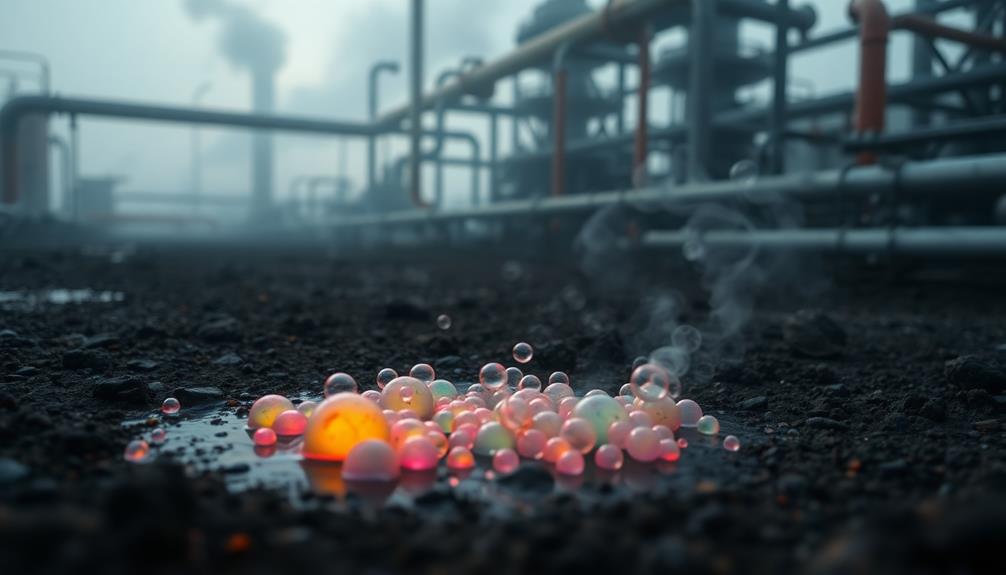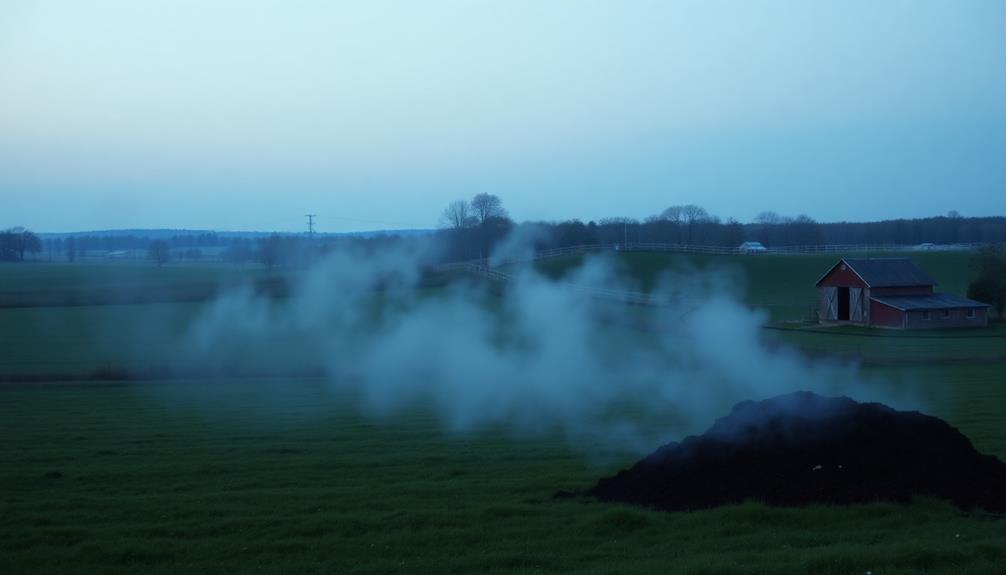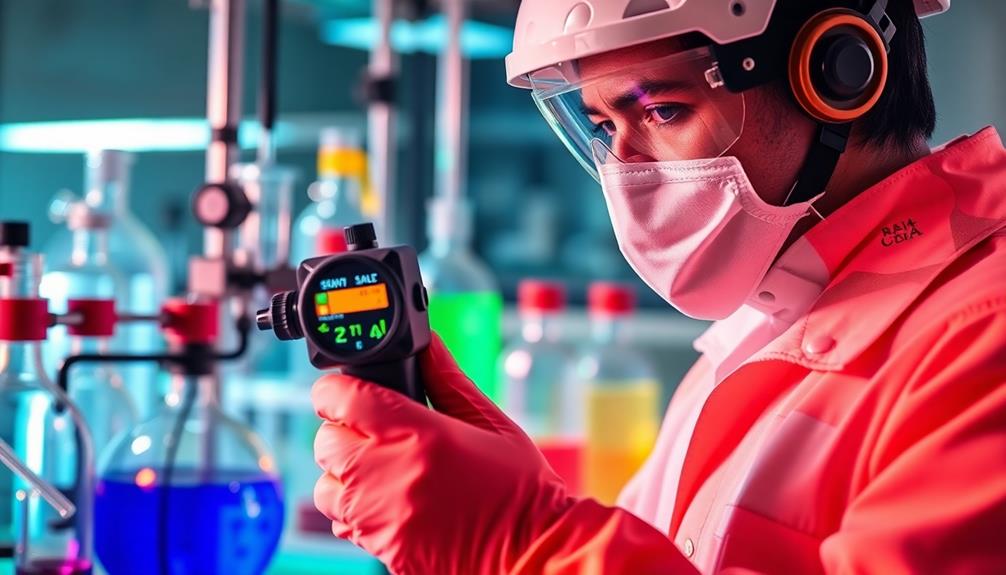Methane itself is odorless and invisible, so you won't smell it at all! However, it's mixed with a special chemical called mercaptan for safety. Mercaptan gives off a strong smell like rotten eggs, which helps you know if there's a gas leak. Even a tiny bit of this scent can be really powerful! You might also think of it like the smell of spoiled food or sewage. Understanding this helps keep you safe. So, the next time you detect a funny smell, remember there's more to discover about why that scent is super important for your safety!
Key Takeaways
- Methane itself is odorless and invisible, making detection difficult without added substances.
- Mercaptan, a compound added to natural gas, gives it a distinctive rotten egg smell.
- The smell of mercaptan can also resemble rotten food or sewage, enhancing its detectability.
- Even small amounts of mercaptan produce a strong scent, serving as a warning for gas leaks.
- Awareness of the mercaptan smell is crucial for safety, prompting immediate action if detected.
Introduction

Understanding what methane smells like is crucial for safety, especially since pure methane is odorless. That's right, it's invisible! To keep you safe, a special scent called mercaptan gets added to natural gas. This chemical gives methane a distinctive rotten egg smell, making it much easier to detect. Can you imagine how hard it would be to notice gas leaks without that smell?
When you catch a whiff of that gas smell, it's your body's way of saying, "Hey, something might be wrong!" The cool thing is, even tiny amounts of mercaptan can create that strong, sulfur-like scent. That's what makes it such an effective warning signal.
If you get familiar with the rotten egg smell of mercaptan, you'll be ready to react quickly if there's ever a gas leak. Knowing what to look out for helps keep you and your loved ones safe.
Description of the Smell

Have you ever encountered a smell that instantly makes you feel uneasy? If you've ever caught a whiff of something that reminds you of rotten eggs, you might be smelling methane gas!
Methane itself is odorless, which can make it tricky to detect. To keep you safe, a special chemical called mercaptan is added to it. This is what gives the gas its unmistakable, sulfur-like odor.
When you smell that rotten egg scent, it's a signal to pay attention. The odor is often compared to rotten food or even sewage. It's not a pleasant smell, but it's super important because it tells you there might be a gas leak.
Natural gas, which is mostly made up of methane, becomes easy to detect because of this strong and unpleasant smell.
Source and Composition

While the smell of mercaptan helps you detect methane leaks, it's important to know where methane comes from and what it's made of. Methane is an interesting gas! It's made of one carbon atom and four hydrogen atoms, which makes it the simplest hydrocarbon. You can find it in natural gas, which many homes use for heating, cooking, and even generating electricity.
But here's the catch: methane itself doesn't have any smell at all! That's why mercaptan is added to natural gas. Mercaptan gives gas a distinctive odor, kind of like rotten eggs or a skunk. This smell is super helpful because, if there's a natural gas leak, you can smell it right away.
Methane is also a significant greenhouse gas. It has a much greater potential for warming the Earth in the short term compared to carbon dioxide.
Typical Scenarios or Environments

Methane is commonly found in various environments, each presenting unique scenarios where its presence is notable.
In your home, you might use natural gas for heating or cooking. While methane itself is odorless, a special smell is added for safety. This smell can remind you of a skunk or rotten eggs, thanks to a chemical called mercaptan.
In rural areas, the smell might come from livestock waste or when farmers use anaerobic digestion to manage waste. You could also notice methane around landfills, where organic waste breaks down and releases gas.
Sometimes, if you're in a basement or a poorly ventilated space, methane can build up, which can be dangerous if you can't smell it.
Another scenario is when you smell sewer gas. That smell is often a mix that includes hydrogen sulfide, which is different but still stinky! Hydrogen sulfide gives off a distinct rotten egg odor, which can be quite unpleasant. So, if you’re wondering, *what does sewer gas smell like*, it’s often described as a combination of decaying organic matter or sulfur-like fumes. If you notice this scent in your home, it’s important to address it quickly as prolonged exposure can lead to health concerns and may indicate plumbing issues.
Emotional or Cultural Associations

The smell of rotten eggs, often associated with mercaptan, evokes strong emotional responses and cultural narratives that highlight the importance of gas safety. When you catch a whiff of that distinct smell, it can make your heart race and trigger feelings of anxiety or urgency. This reaction isn't just a personal experience; it reflects a shared understanding across many cultures about the dangers of gas leaks.
In regions where gas is used for heating and cooking, this smell is a reminder to stay alert and be mindful of safety. The absence of a natural smell for methane has led to creative expressions in art and education, symbolizing hidden dangers. These cultural stories emphasize the need for awareness and preparedness in communities.
The smell of mercaptan is a safety feature, designed to help you recognize when gas is present. It's a little like a superhero cape, swooping in to save the day by keeping you and your loved ones safe.
Health or Safety Considerations

When you encounter the smell of mercaptan, it's crucial to take immediate action. This strong, sulfur-like odor is added to methane gas to help you detect gas leaks. If you smell it, don't ignore it! Quickly check for warning signs like hissing sounds or other unusual smells.
If you're in a confined space and smell mercaptan, you could be at risk. Prolonged exposure to methane can lead to asphyxiation because it can push oxygen out of the air. That's why it's essential to leave the area right away. High concentrations of methane can also be explosive, so getting to safety should be your top priority!
To keep your home safe, remember to regularly maintain your gas appliances and ensure proper ventilation. This can help reduce the risk of methane building up indoors.
You can also talk to your family about recognizing the signs of gas leaks. By staying aware and prepared, you make your home a safer place for everyone. Always trust your nose, and when in doubt, get out!
Final Thoughts

In summary, understanding the characteristics of methane and its smell is vital for your safety. While methane itself is odorless and sneaky, it can be tricky to detect. That's why they add a special chemical called mercaptan to natural gas. This additive creates a strong, rotten egg smell that helps you notice gas leaks. Isn't that smart?
Familiarizing yourself with the scent of mercaptan is essential, especially if you ever notice any strange sewer gas odors around your home. If you can smell that rotten egg scent, it's a big warning sign. It means you should take action quickly and get to safety!
Without the mercaptan smell, methane could be hiding and causing serious risks, like asphyxiation or even explosions. Yikes! So, make sure to pay attention to those odors. If you ever smell mercaptan, don't hesitate. Go outside, call for help, and stay safe.
In the end, knowing what to smell for can make a huge difference in keeping you and your loved ones safe. Stay alert, and remember: safety first!
Frequently Asked Questions
What Is the Smell of Methane?
When you encounter methane, you won't notice any smell. However, if you detect a pungent, rotten egg-like odor, that's mercaptan, added for safety. Always stay alert to recognize potential gas leaks and ensure safety.
Can Smelling Methane Gas Make You Sick?
No, you can't smell methane itself since it's odorless. However, if you're in an area with a gas leak, you might experience symptoms like dizziness or headaches from oxygen displacement, which can be dangerous.
Does Methane Smell Like Eggs?
No, methane itself doesn't smell like eggs. It's odorless, but an added substance called mercaptan gives it a scent similar to rotten eggs. You should always take that smell seriously and act quickly if you detect it.
Does Methane Have a Sweet Smell?
No, methane doesn't have a sweet smell. It's actually odorless. If you notice a sweet scent, it might be due to other substances or the odorant added to natural gas for safety. Stay alert!









